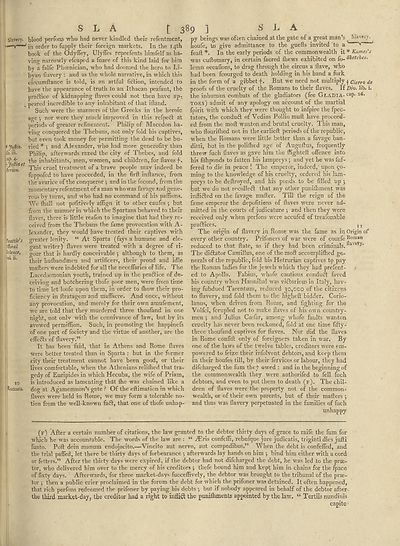Encyclopaedia Britannica, or, a Dictionary of arts, sciences, and miscellaneous literature : enlarged and improved. Illustrated with nearly six hundred engravings > Volume 19, Scripture-SUG
(433) Page 389
Download files
Complete book:
Individual page:
Thumbnail gallery: Grid view | List view

SLA t 389 ] SLA
Slavery, blood perfons who had never kindled their refentraent,
'■—■V"""''in order to fupply their foreign markets. In the 14th
book of the Odyffey, Ulyffes reprefents himfelf as ha¬
ving narrowly efcaped a fnare of this kind laid for him
by a falfe Phoenician, who had doomed the hero to Li¬
byan flavery : and as the whole narrative, in which this
circumftance is told, is an artful fiftion, intended to
have the appearance of truth to an Ithacan peafant, the
practice of kidnapping flaves could not then have ap-
> peared incredible to any inhabitant of that iflahd.
Such were the manners of the Greeks in the heroic
age •, nor were they much improved in this refpecf at
periods of greater refinement. Philip of Macedon ha¬
ving conquered the Thebans, not only fold his captives,
but even took money for permitting the dead to be bu-
f Juftin. ried * j and Alexander, who had more generofity than
ib.iii. Philip, afterwards razed the city of Thebes, and fold
raP- j-. the inhabitants, men, women, and children, for Haves f.
cruel treatment of a brave people may indeed be
fuppofed to have proceeded, in the firft inftanee, from
the avarice of the conqueror ; and in the fecond, from the
momentary refentment of a man who was favageand gene¬
rous by turns, and who had no command of his paffions.
We (hall not pofitively affign it to other caufes \ but
from the manner in which the Spartans behaved to their
flaves, there is little reafon to imagine that had they re¬
ceived from the Thebans the fame provocation with A-
lexander, they would have treated their captives with
,eattie,s greater lenity. “ At Sparta (fays a humane and ele-
■toral gant writer) flaves were treated with a degree of ri-
kitnee, gour that is hardly conceivable 5 although to them, as
°*'u* their hufbandmen and artificers, their proud and idle
mailers were indebted for all the neceffaries of life. The
Lacedaemonian youth, trained up in the pradlice of de¬
ceiving and butchering thofe poor men, were from time
to time let loofe upon them, in order to fhow their pro¬
ficiency in flratagem and malTacre. And once, without
any provocation, and merely for their own amufement,
we are told that they murdered three thoufand in one
night, not onlv with the connivance of law, but by its
avowed permiflion. Such, in promoting the happinefs
of one part of fociety and the virtue of another, are the
effefts of flavery.”
It has been faid, that in Athens and Rome flaves
were better treated than in Sparta : but in the former
city their treatment cannot have been good, or their
lives comfortable, when the Athenians relifhed that tra¬
gedy of Euripides in which Hecuba, the wife of Priam,
10 is introduced as lamenting that fhe was chained like a
Romans, dog at Agamemnon’s gate ? Of the eftimation in which
flaves were held in Rome, we may form a tolerable no¬
tion from the well-known faft, that one of thofe unhap¬
py beings was often chained at the gate of a great min’s Slavery,
houfe, to give admittance to the guefls invited to a ^
feafl *. In the early periods of the commonwealth it* Karnes's
was cuflomary, in certain facred fliews exhibited on fo- Sketches.
lemn occafions, to drag through the circus a Have, who
had been fcourged to death holding in his hand a fork
in the form of a gibbet f. But we need not multiply | Cicero de
proofs of the cruelty of the Romans to their flaves. If Bin. lib. i.
the inhuman combats of the gladiators (fee GLADlA-caP- 2<^
tors) admit of any apology on account of the martial
fpirit with which they were thought to infpire the fpec-
tators, the condudl of Vedius Pollio muft have proceed¬
ed from the moft wanton and brutal cruelty. This man,
who flouriflred not in the earliefl periods of the republic,
when the Romans were little better than a favage ban¬
ditti, but in the polifhed age of Auguflus, frequently
threw fuch flaves as gave him the High tell offence into
his fifhponds to fatten his lampreys ; and yet he w7as fuf-
fered to die in peace ! The emperor, indeed, upon jo¬
ining to the knowledge of his cruelty, ordered his lam¬
preys to be deflroyed, and his ponds to be filled up 5
but we do not recolledt that any other punithment was
infli&ed on the favage mailer. Till the reign of the
fame emperor the depofitions of flaves were never ad¬
mitted in the courts of judicature ; and then they were
received only when perfons were accufed of treafonable
praflices. j x
The origin of flavery in Rome was the fame as in Origin of*
every other country. Prifoners of wrar were of courfe R°man
reduced to that Hate, as if they had been criminals. ^a%er^*
The dictator Camillus, one of the moll accomplifhed ge¬
nerals of the republic, fold his Hetrurian captives tp pay
the Roman ladies for the jewels which they bad prefent-
ed to Apollo. Fabius, whofe cautious conduct faved
his country when Hannibal was vi&orious in Italy, hav¬
ing fubdued Tarentum, reduced 30,000 of the citizens
to flavery, and fold them to the highefl bidder. Corio-
lanus, when driven from Rome, and fighting for the
Volfci, fcrupled not to make flaves of his own country¬
men ; and Julius Csefar, among whofe faults wanton
cruelty has never been reckoned, fold at one time fifty-
three thoufand captives for flaves. Nor did the flaves
in Rome confifl only of foreigners taken in war. By
one of the laws of the twelve tables, creditors rvere em¬
powered to feize their infolvent debtors, and keep them
in their houfes till, by their fervices or labour, they had
difeharged the fum they owed : and in the beginningof
the commonwealth they were authorifed to fell fuch
debtors, and even to put them to death (f). The chil¬
dren of flaves were the property not of the common¬
wealth, or of their own parents, but of their mafters ;
and thus was flavery perpetuated in the families of fuch
unhappy
(f) After a certain number of citations, the law granted to the debtor thirty days of grace to raife the fum for
which he was accountable. The words of the law are : “ iEris confefli, rebufque jure judicatis, triginti dies juiti
funto. Poft dein manum endojacito.—Vincito aut nervo, aut compedibus.” When the debt is confeffed, and
the trial paffed, let there be thirty days of forbearance •, afterwards lay hands on him \ bind him either with a cord
or fetters.” After the thirty days were expired, if the debtor had not difeharged the debt, he was led to the prae¬
tor, who delivered him over to the mercy of his creditors *, thefe bound him and kept him in chains for the fpace
of fixty days. Afterwards, for three market-days fucceffively, the debtor was brought to the tribunal of the prae¬
tor \ then a public crier proclaimed in the forum the debt for which the prifoner was detained. It often happened,
that rich perfons redeemed the prifoner by paying his debts •, but if nobody appeared in behalf of the debtor after-
the third market-day, the creditor had a right to inflid the punilhments appointed by the la tv. “ Tertiis nundinis
capite
Slavery, blood perfons who had never kindled their refentraent,
'■—■V"""''in order to fupply their foreign markets. In the 14th
book of the Odyffey, Ulyffes reprefents himfelf as ha¬
ving narrowly efcaped a fnare of this kind laid for him
by a falfe Phoenician, who had doomed the hero to Li¬
byan flavery : and as the whole narrative, in which this
circumftance is told, is an artful fiftion, intended to
have the appearance of truth to an Ithacan peafant, the
practice of kidnapping flaves could not then have ap-
> peared incredible to any inhabitant of that iflahd.
Such were the manners of the Greeks in the heroic
age •, nor were they much improved in this refpecf at
periods of greater refinement. Philip of Macedon ha¬
ving conquered the Thebans, not only fold his captives,
but even took money for permitting the dead to be bu-
f Juftin. ried * j and Alexander, who had more generofity than
ib.iii. Philip, afterwards razed the city of Thebes, and fold
raP- j-. the inhabitants, men, women, and children, for Haves f.
cruel treatment of a brave people may indeed be
fuppofed to have proceeded, in the firft inftanee, from
the avarice of the conqueror ; and in the fecond, from the
momentary refentment of a man who was favageand gene¬
rous by turns, and who had no command of his paffions.
We (hall not pofitively affign it to other caufes \ but
from the manner in which the Spartans behaved to their
flaves, there is little reafon to imagine that had they re¬
ceived from the Thebans the fame provocation with A-
lexander, they would have treated their captives with
,eattie,s greater lenity. “ At Sparta (fays a humane and ele-
■toral gant writer) flaves were treated with a degree of ri-
kitnee, gour that is hardly conceivable 5 although to them, as
°*'u* their hufbandmen and artificers, their proud and idle
mailers were indebted for all the neceffaries of life. The
Lacedaemonian youth, trained up in the pradlice of de¬
ceiving and butchering thofe poor men, were from time
to time let loofe upon them, in order to fhow their pro¬
ficiency in flratagem and malTacre. And once, without
any provocation, and merely for their own amufement,
we are told that they murdered three thoufand in one
night, not onlv with the connivance of law, but by its
avowed permiflion. Such, in promoting the happinefs
of one part of fociety and the virtue of another, are the
effefts of flavery.”
It has been faid, that in Athens and Rome flaves
were better treated than in Sparta : but in the former
city their treatment cannot have been good, or their
lives comfortable, when the Athenians relifhed that tra¬
gedy of Euripides in which Hecuba, the wife of Priam,
10 is introduced as lamenting that fhe was chained like a
Romans, dog at Agamemnon’s gate ? Of the eftimation in which
flaves were held in Rome, we may form a tolerable no¬
tion from the well-known faft, that one of thofe unhap¬
py beings was often chained at the gate of a great min’s Slavery,
houfe, to give admittance to the guefls invited to a ^
feafl *. In the early periods of the commonwealth it* Karnes's
was cuflomary, in certain facred fliews exhibited on fo- Sketches.
lemn occafions, to drag through the circus a Have, who
had been fcourged to death holding in his hand a fork
in the form of a gibbet f. But we need not multiply | Cicero de
proofs of the cruelty of the Romans to their flaves. If Bin. lib. i.
the inhuman combats of the gladiators (fee GLADlA-caP- 2<^
tors) admit of any apology on account of the martial
fpirit with which they were thought to infpire the fpec-
tators, the condudl of Vedius Pollio muft have proceed¬
ed from the moft wanton and brutal cruelty. This man,
who flouriflred not in the earliefl periods of the republic,
when the Romans were little better than a favage ban¬
ditti, but in the polifhed age of Auguflus, frequently
threw fuch flaves as gave him the High tell offence into
his fifhponds to fatten his lampreys ; and yet he w7as fuf-
fered to die in peace ! The emperor, indeed, upon jo¬
ining to the knowledge of his cruelty, ordered his lam¬
preys to be deflroyed, and his ponds to be filled up 5
but we do not recolledt that any other punithment was
infli&ed on the favage mailer. Till the reign of the
fame emperor the depofitions of flaves were never ad¬
mitted in the courts of judicature ; and then they were
received only when perfons were accufed of treafonable
praflices. j x
The origin of flavery in Rome was the fame as in Origin of*
every other country. Prifoners of wrar were of courfe R°man
reduced to that Hate, as if they had been criminals. ^a%er^*
The dictator Camillus, one of the moll accomplifhed ge¬
nerals of the republic, fold his Hetrurian captives tp pay
the Roman ladies for the jewels which they bad prefent-
ed to Apollo. Fabius, whofe cautious conduct faved
his country when Hannibal was vi&orious in Italy, hav¬
ing fubdued Tarentum, reduced 30,000 of the citizens
to flavery, and fold them to the highefl bidder. Corio-
lanus, when driven from Rome, and fighting for the
Volfci, fcrupled not to make flaves of his own country¬
men ; and Julius Csefar, among whofe faults wanton
cruelty has never been reckoned, fold at one time fifty-
three thoufand captives for flaves. Nor did the flaves
in Rome confifl only of foreigners taken in war. By
one of the laws of the twelve tables, creditors rvere em¬
powered to feize their infolvent debtors, and keep them
in their houfes till, by their fervices or labour, they had
difeharged the fum they owed : and in the beginningof
the commonwealth they were authorifed to fell fuch
debtors, and even to put them to death (f). The chil¬
dren of flaves were the property not of the common¬
wealth, or of their own parents, but of their mafters ;
and thus was flavery perpetuated in the families of fuch
unhappy
(f) After a certain number of citations, the law granted to the debtor thirty days of grace to raife the fum for
which he was accountable. The words of the law are : “ iEris confefli, rebufque jure judicatis, triginti dies juiti
funto. Poft dein manum endojacito.—Vincito aut nervo, aut compedibus.” When the debt is confeffed, and
the trial paffed, let there be thirty days of forbearance •, afterwards lay hands on him \ bind him either with a cord
or fetters.” After the thirty days were expired, if the debtor had not difeharged the debt, he was led to the prae¬
tor, who delivered him over to the mercy of his creditors *, thefe bound him and kept him in chains for the fpace
of fixty days. Afterwards, for three market-days fucceffively, the debtor was brought to the tribunal of the prae¬
tor \ then a public crier proclaimed in the forum the debt for which the prifoner was detained. It often happened,
that rich perfons redeemed the prifoner by paying his debts •, but if nobody appeared in behalf of the debtor after-
the third market-day, the creditor had a right to inflid the punilhments appointed by the la tv. “ Tertiis nundinis
capite
Set display mode to:
![]() Universal Viewer |
Universal Viewer | ![]() Mirador |
Large image | Transcription
Mirador |
Large image | Transcription
Images and transcriptions on this page, including medium image downloads, may be used under the Creative Commons Attribution 4.0 International Licence unless otherwise stated. ![]()
| Permanent URL | https://digital.nls.uk/192700911 |
|---|
| Attribution and copyright: |
|
|---|
| Description | Ten editions of 'Encyclopaedia Britannica', issued from 1768-1903, in 231 volumes. Originally issued in 100 weekly parts (3 volumes) between 1768 and 1771 by publishers: Colin Macfarquhar and Andrew Bell (Edinburgh); editor: William Smellie: engraver: Andrew Bell. Expanded editions in the 19th century featured more volumes and contributions from leading experts in their fields. Managed and published in Edinburgh up to the 9th edition (25 volumes, from 1875-1889); the 10th edition (1902-1903) re-issued the 9th edition, with 11 supplementary volumes. |
|---|---|
| Additional NLS resources: |
|

